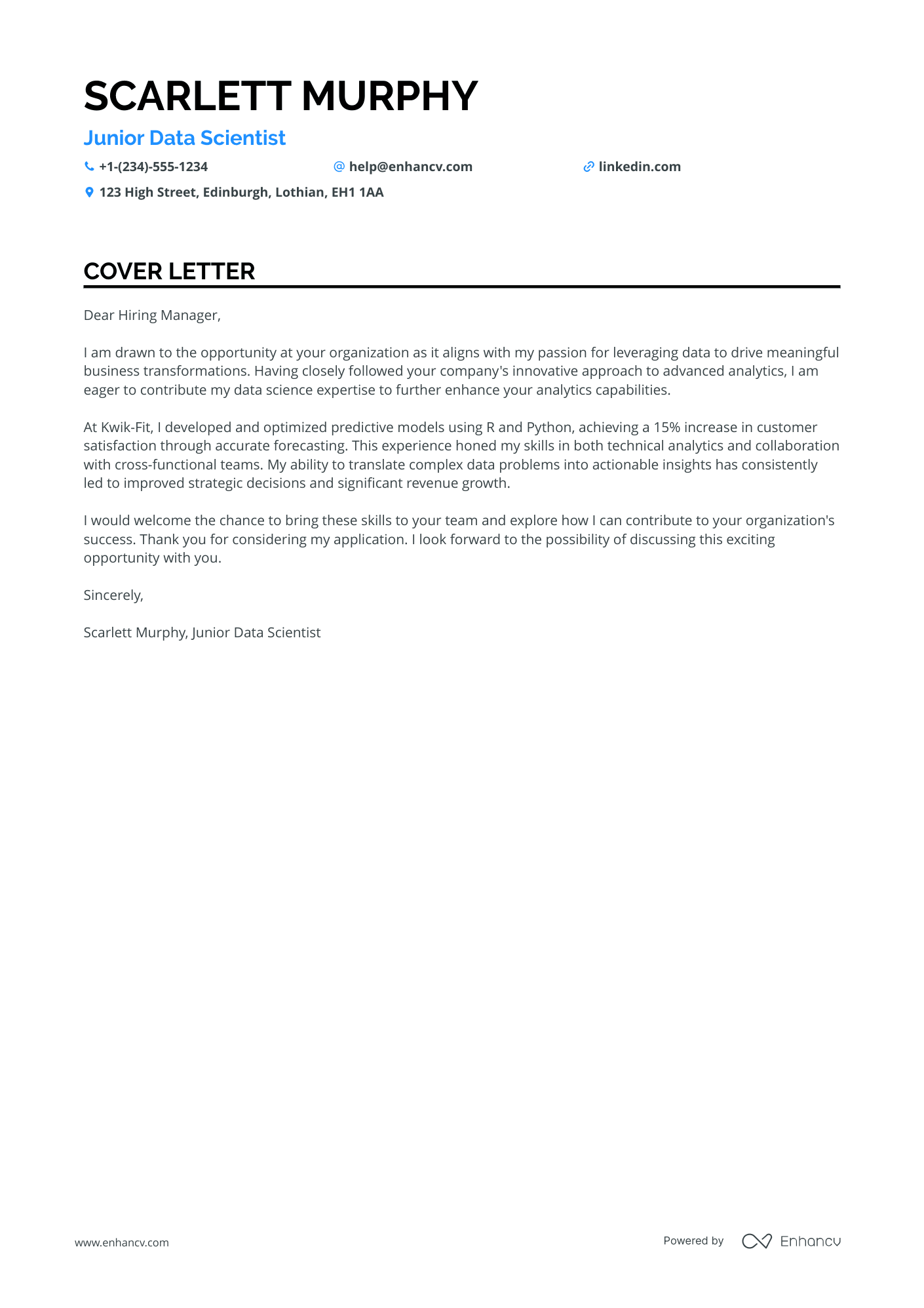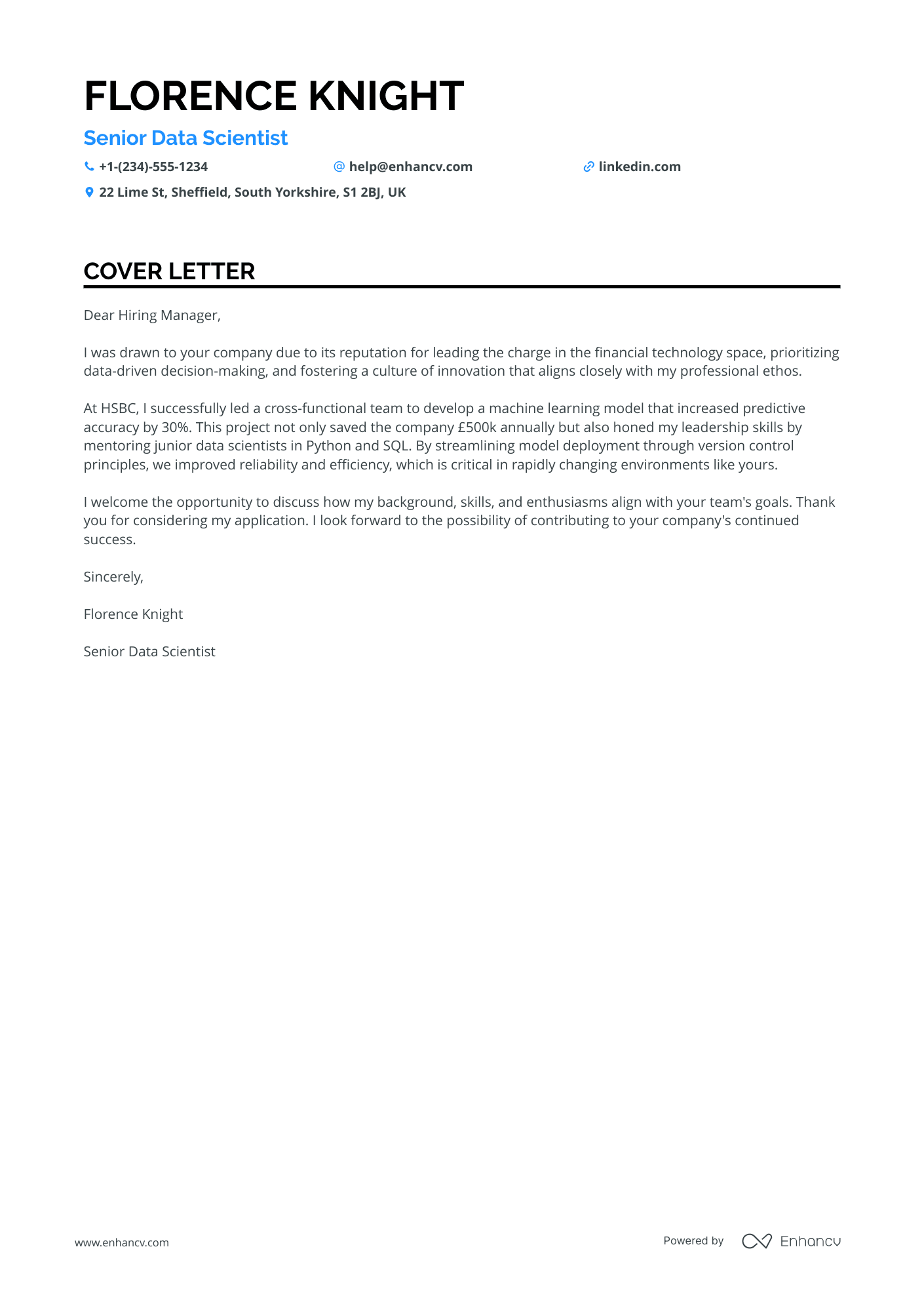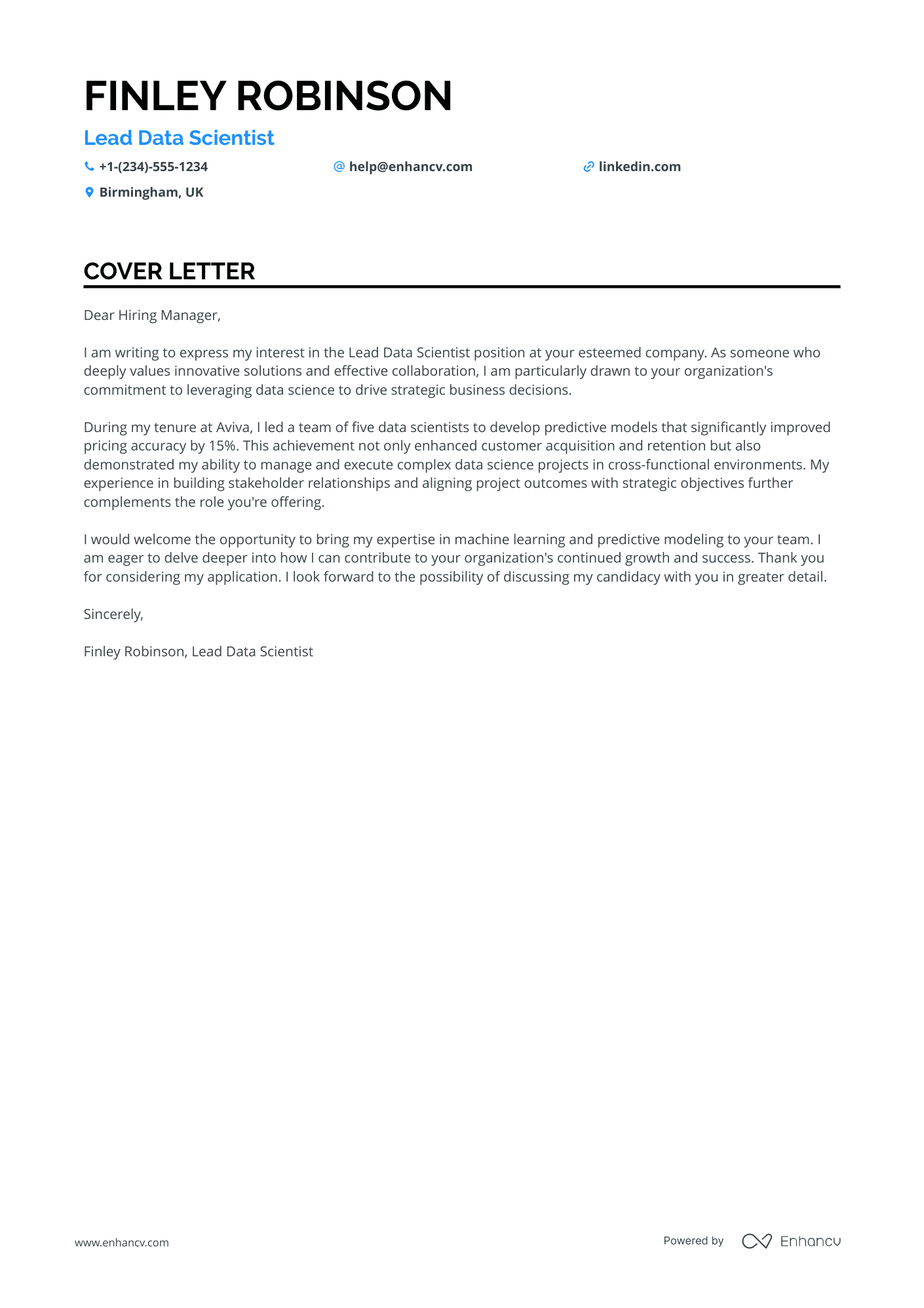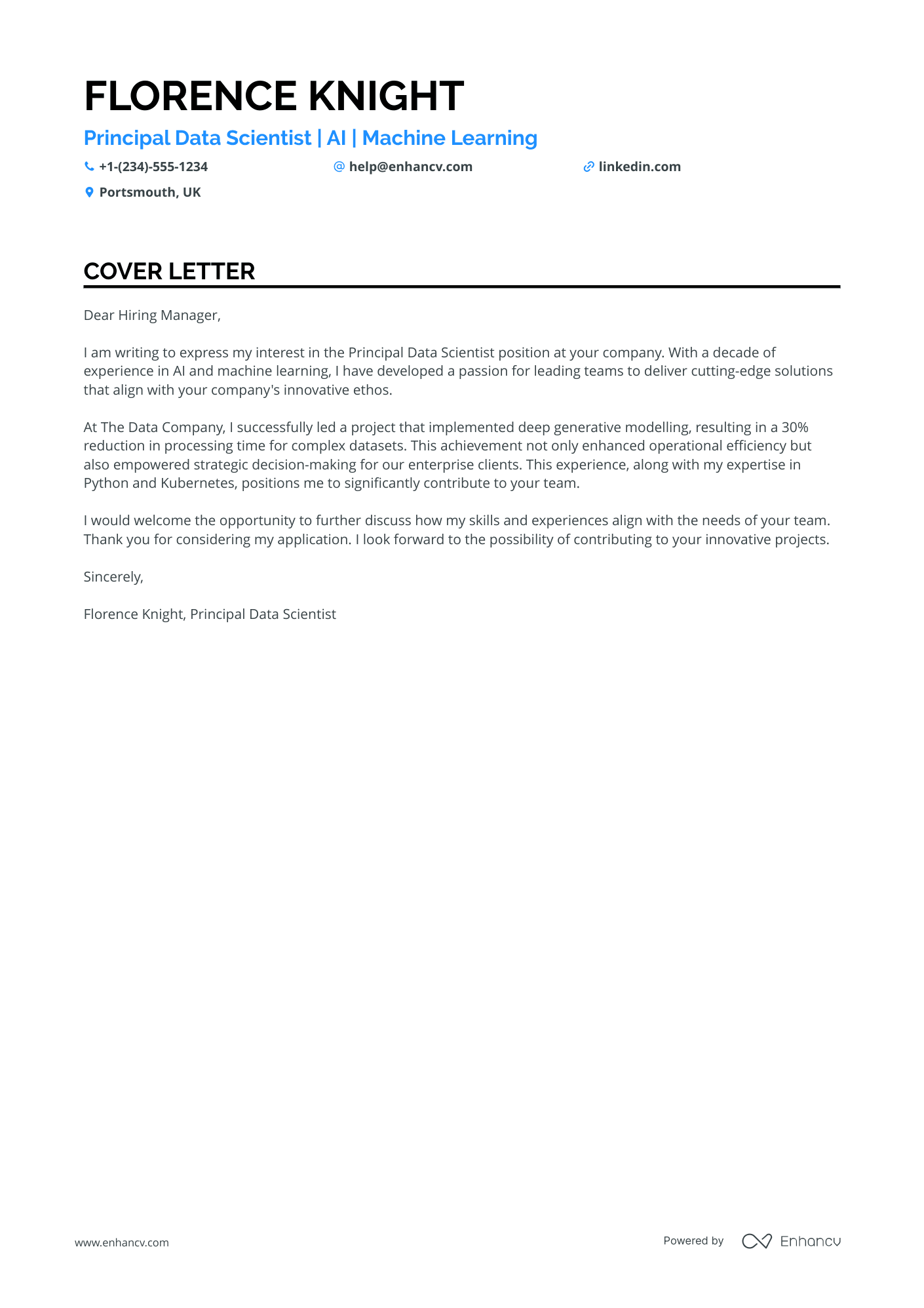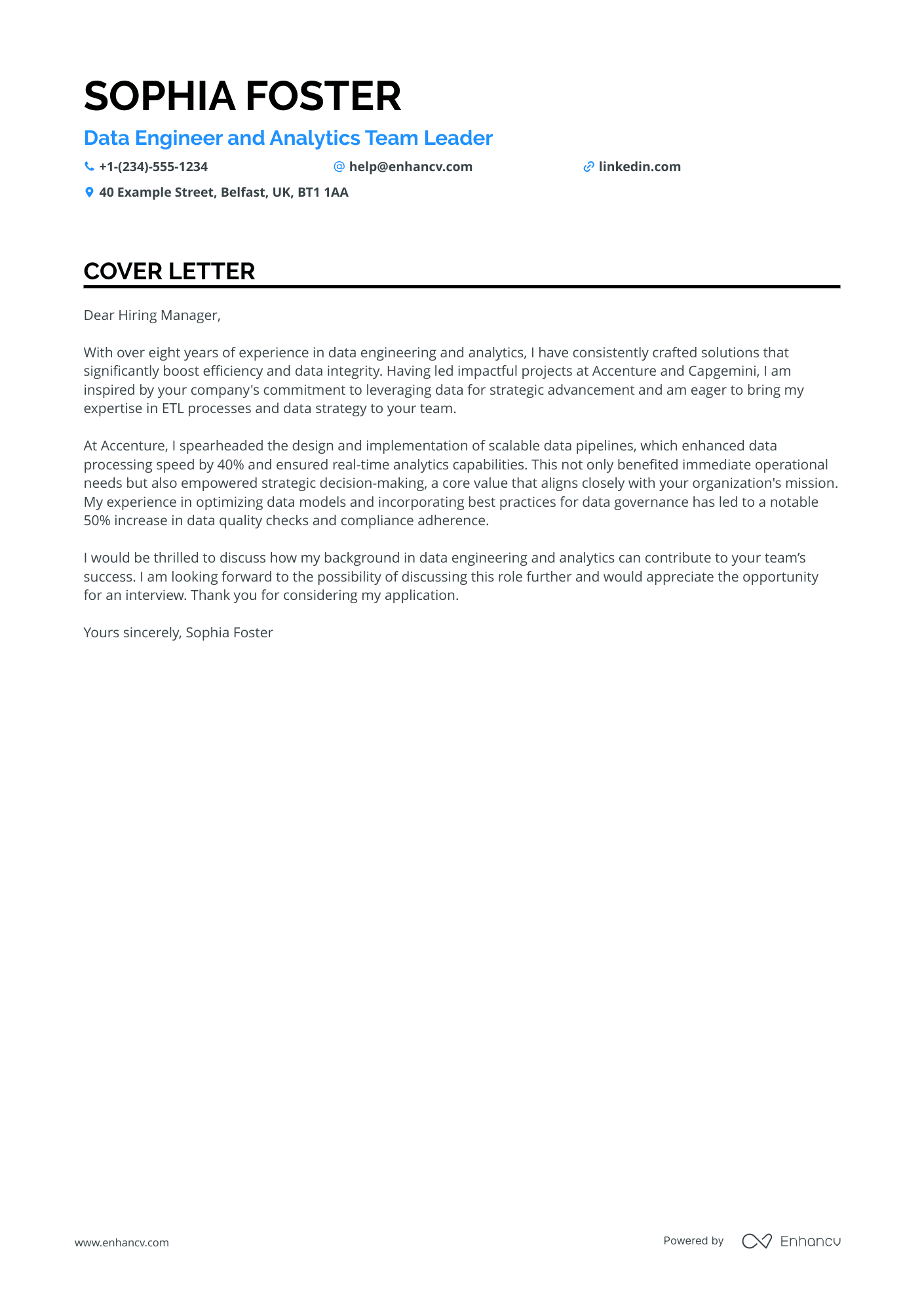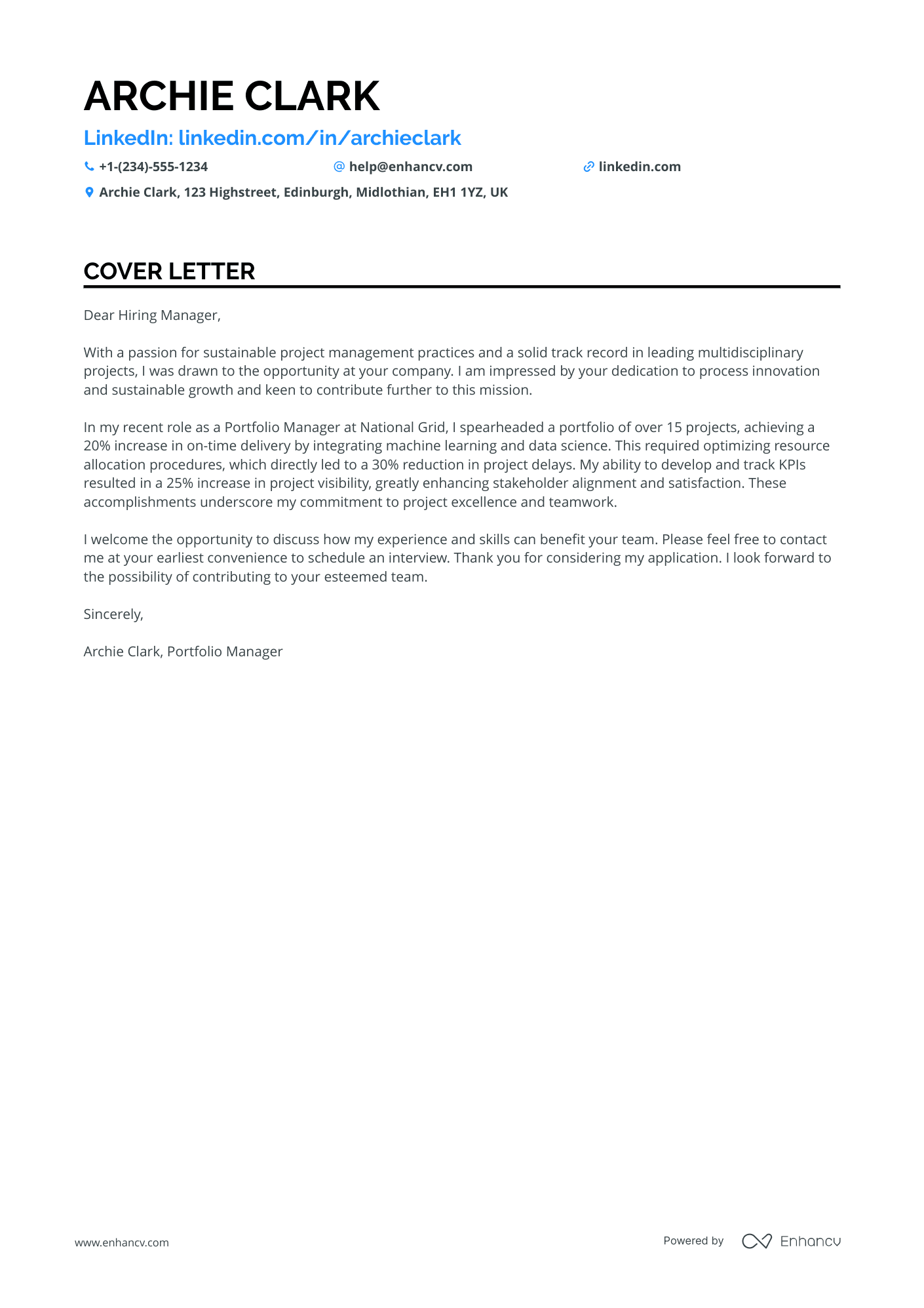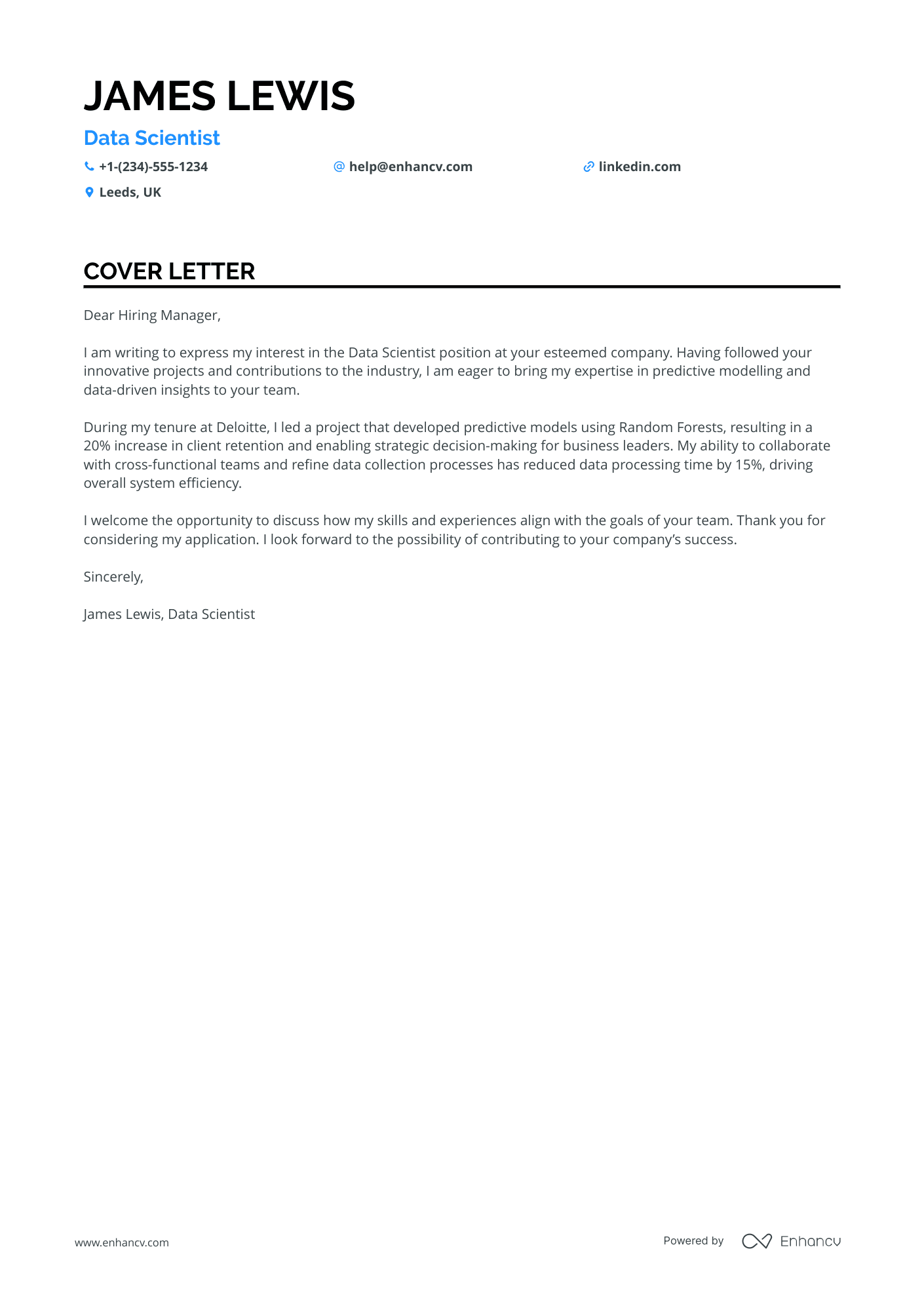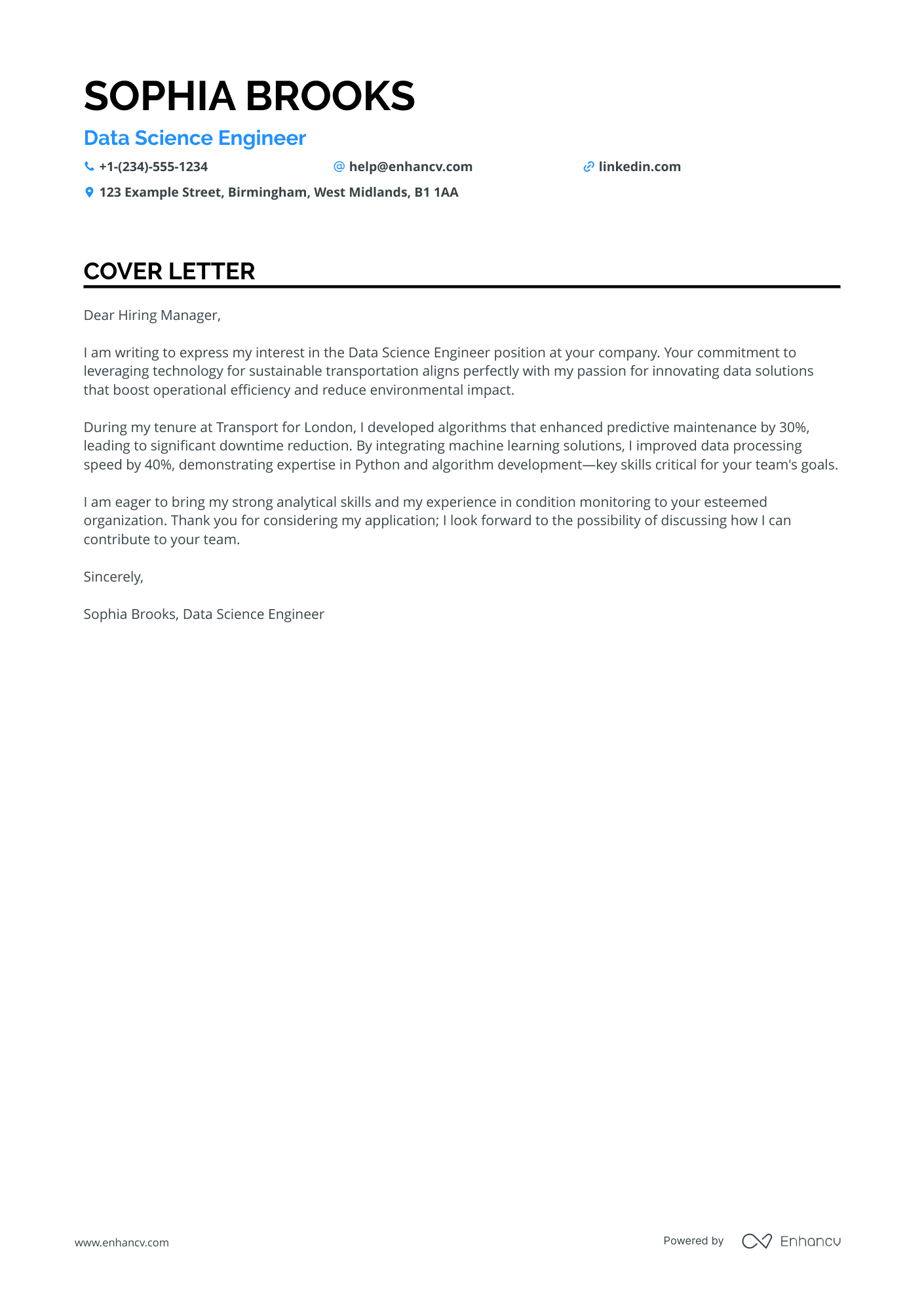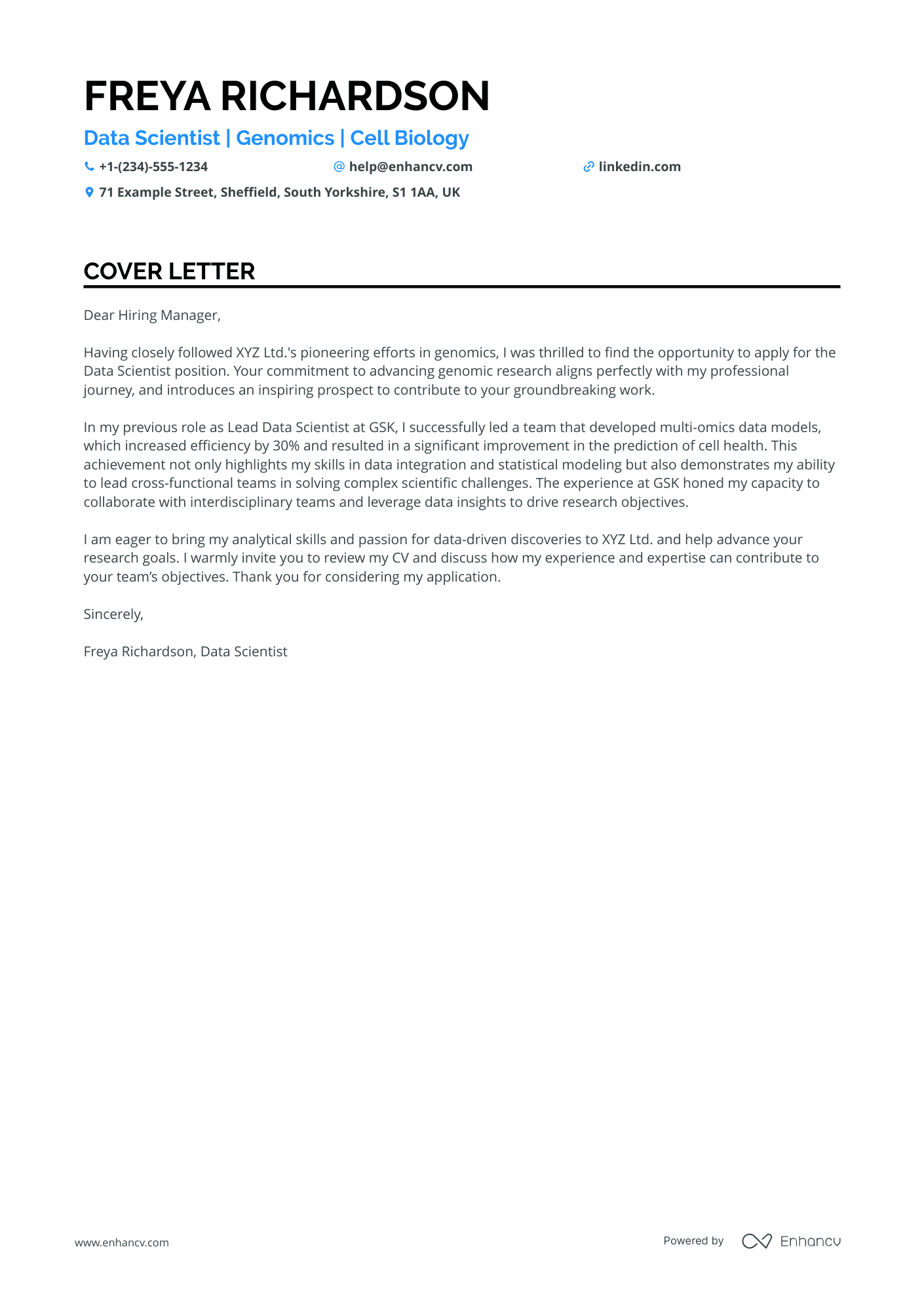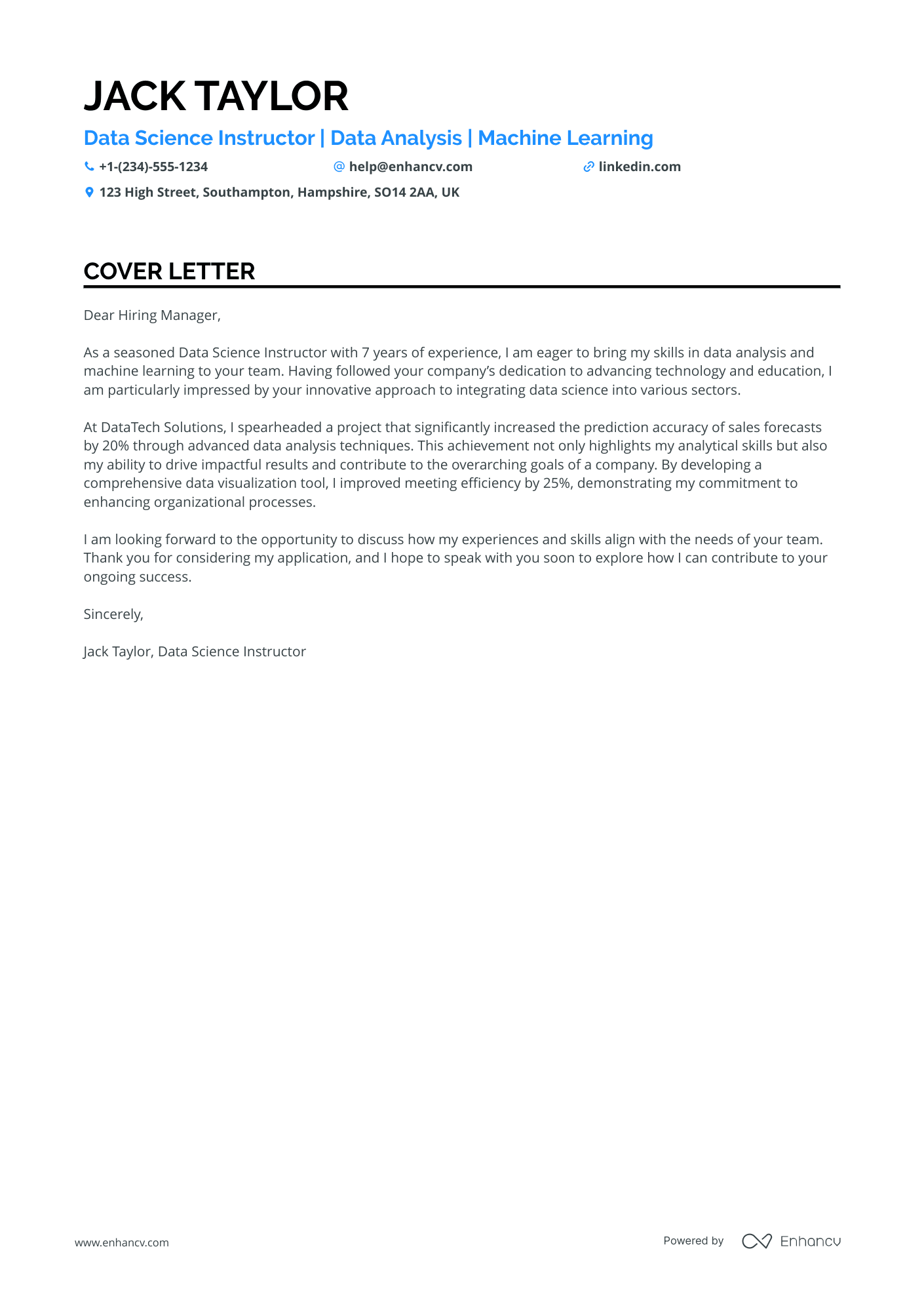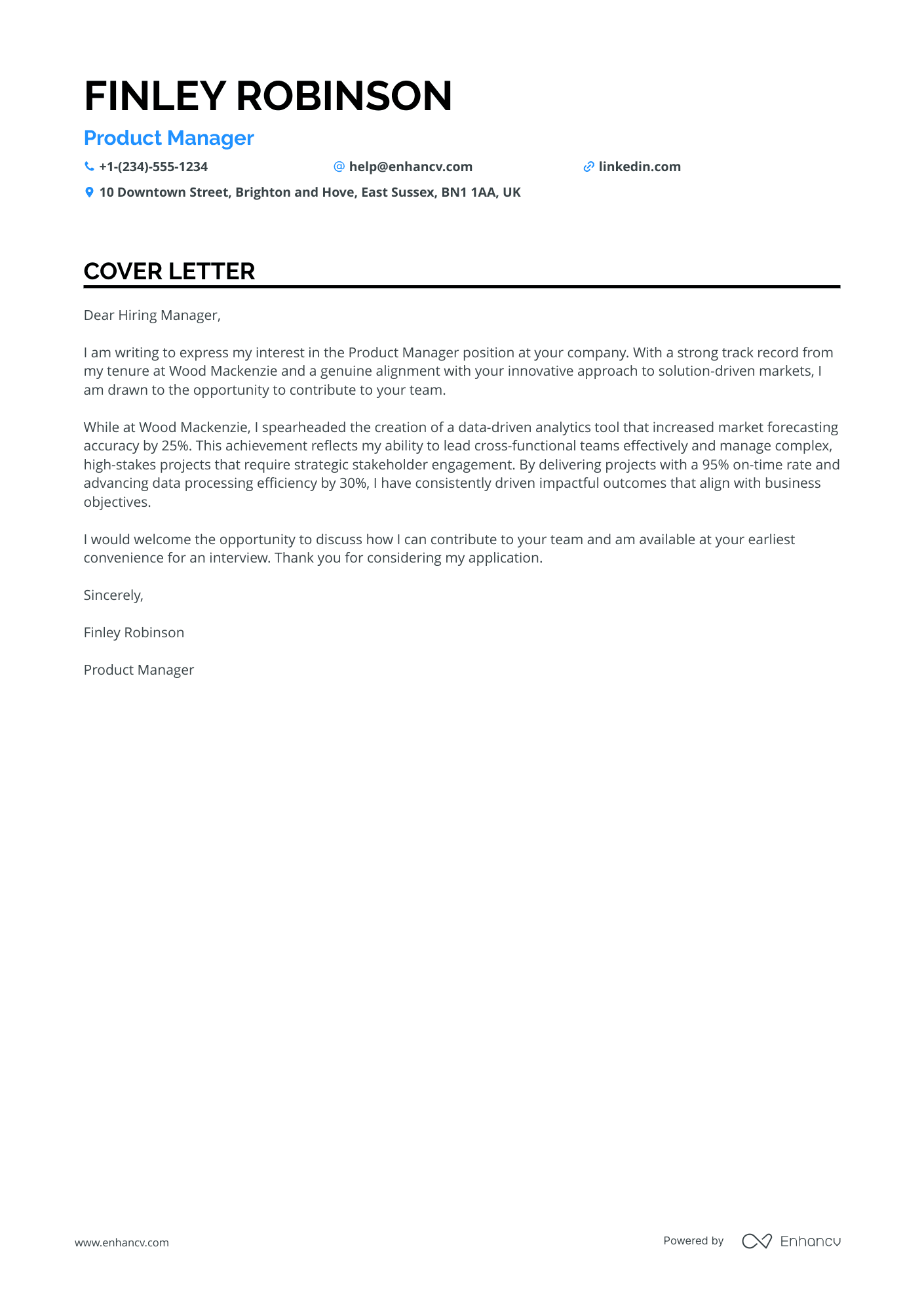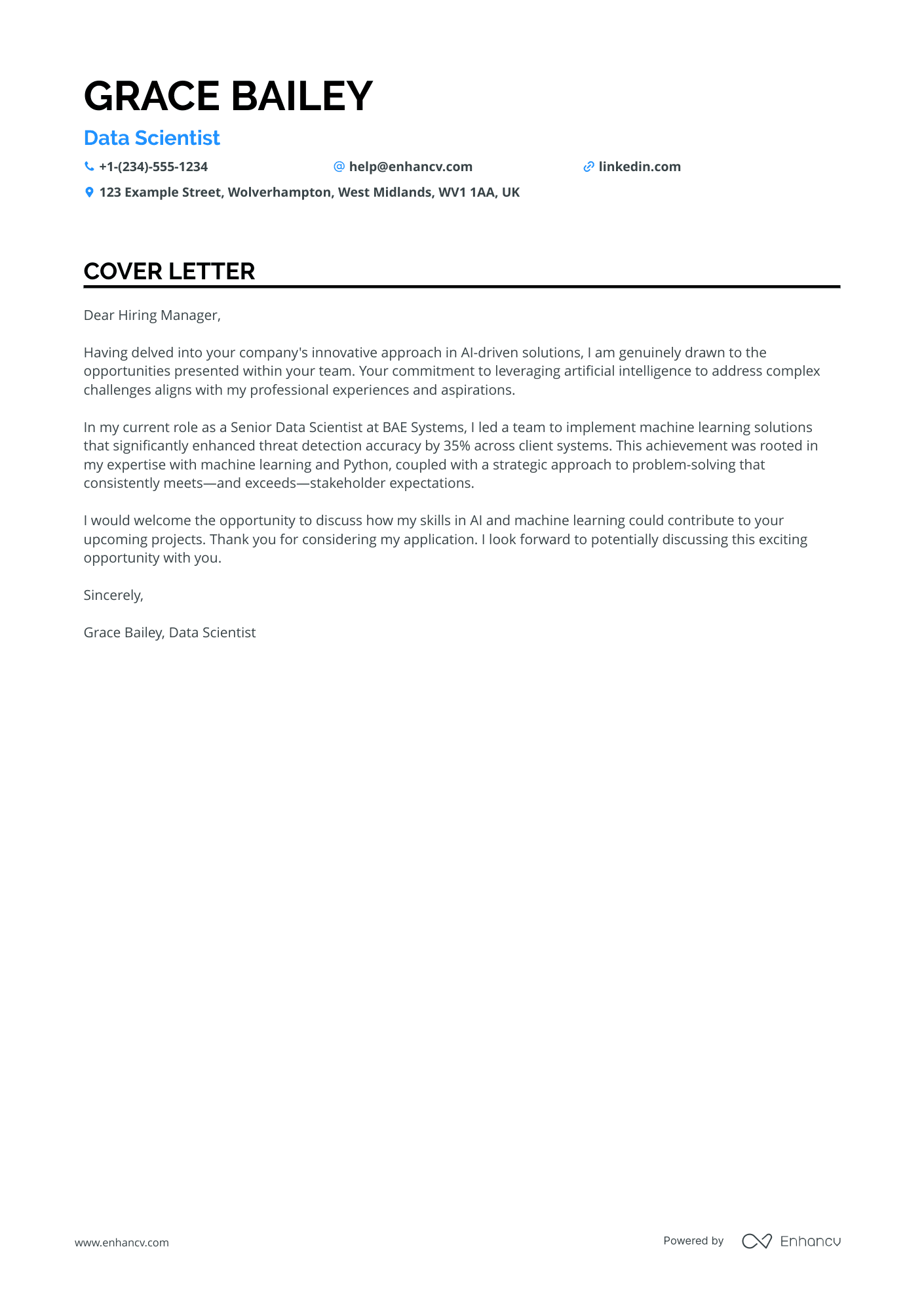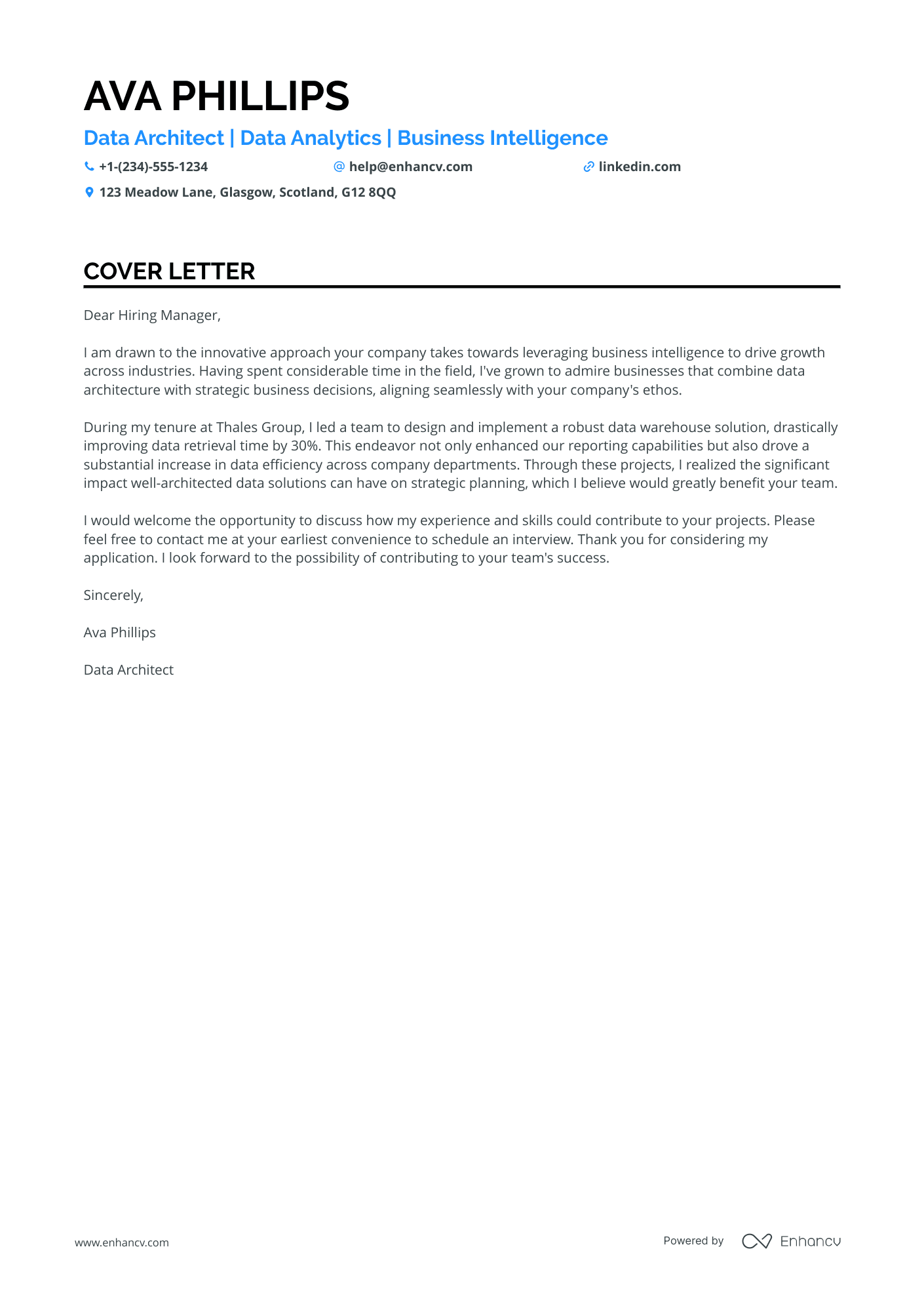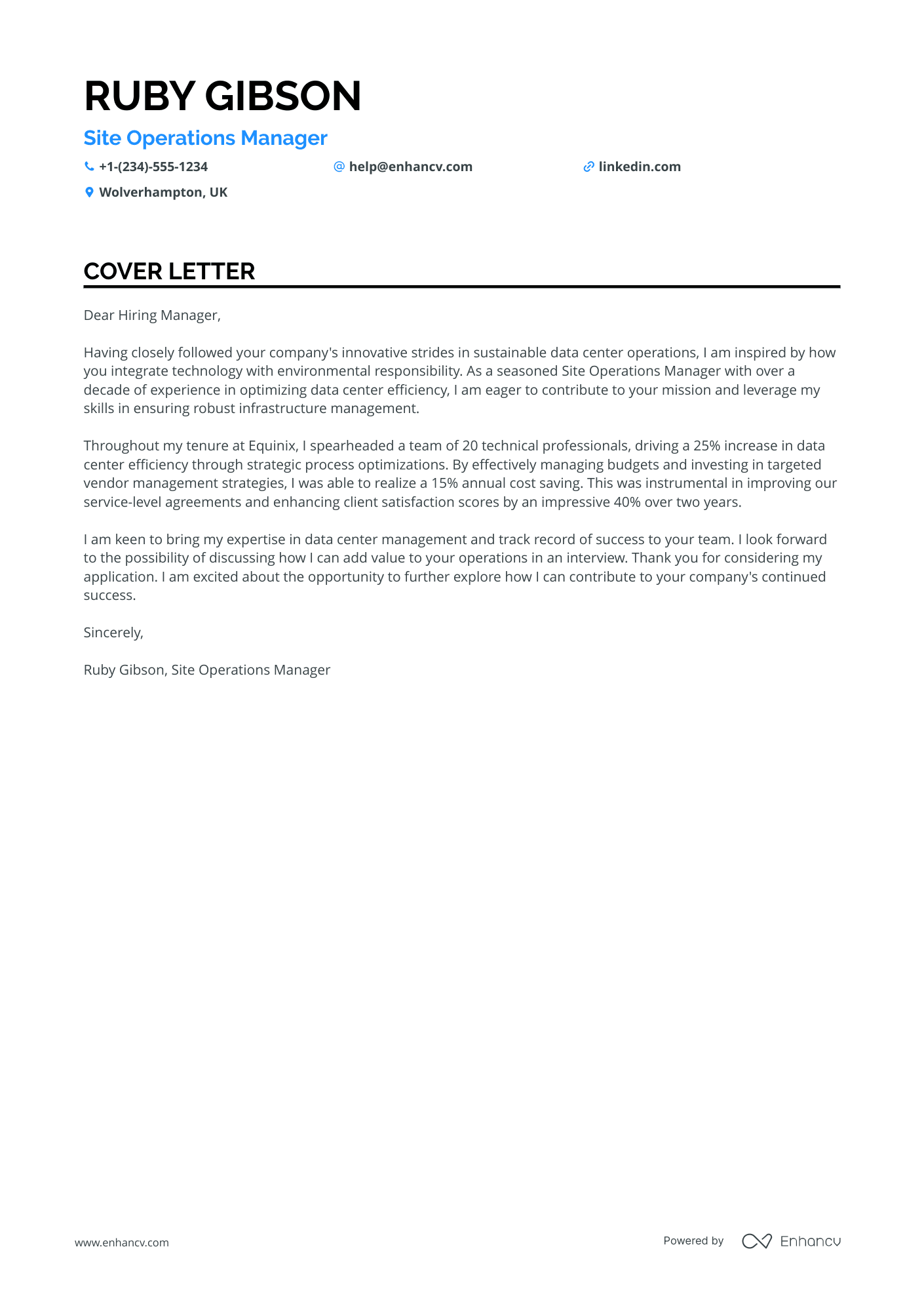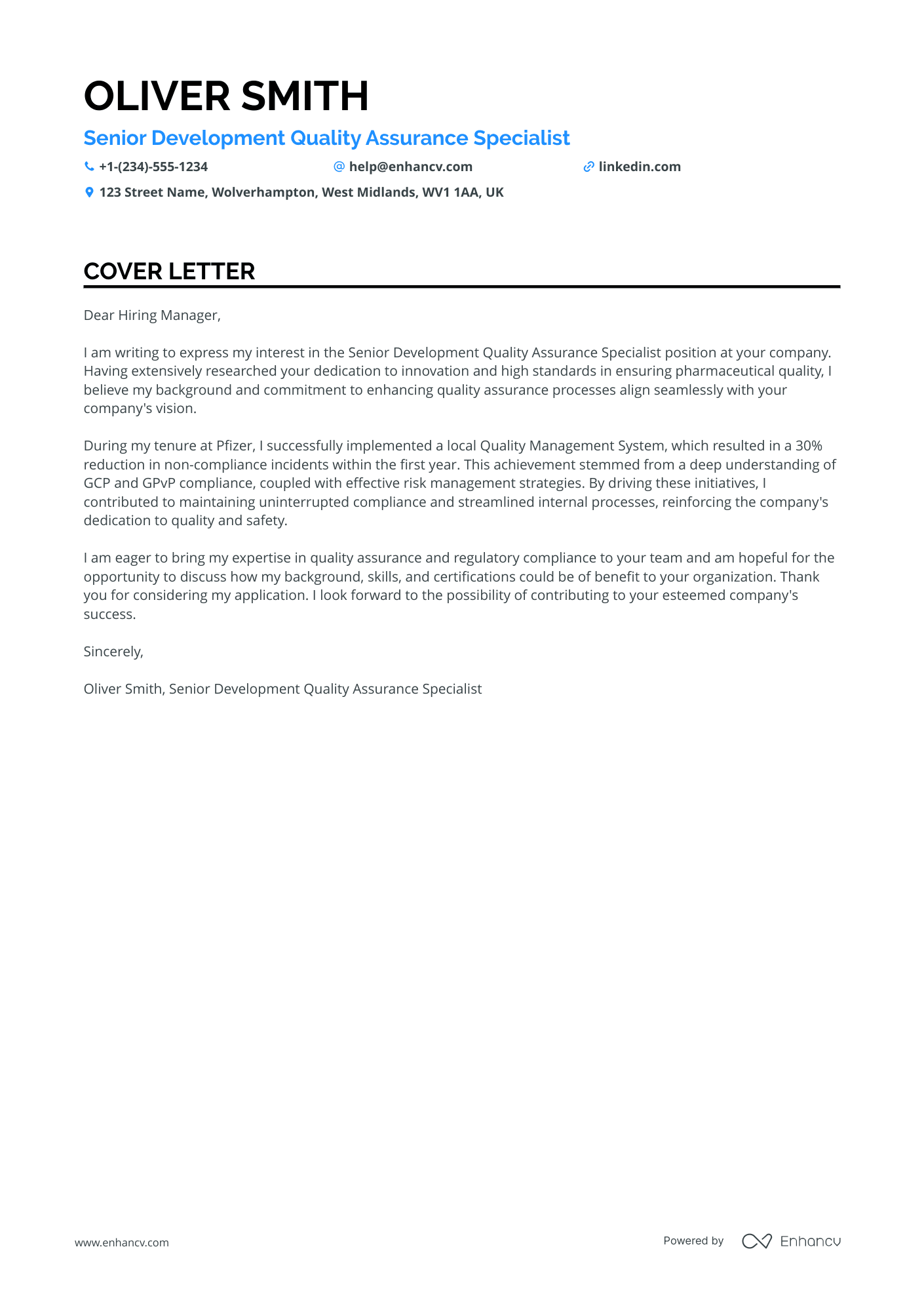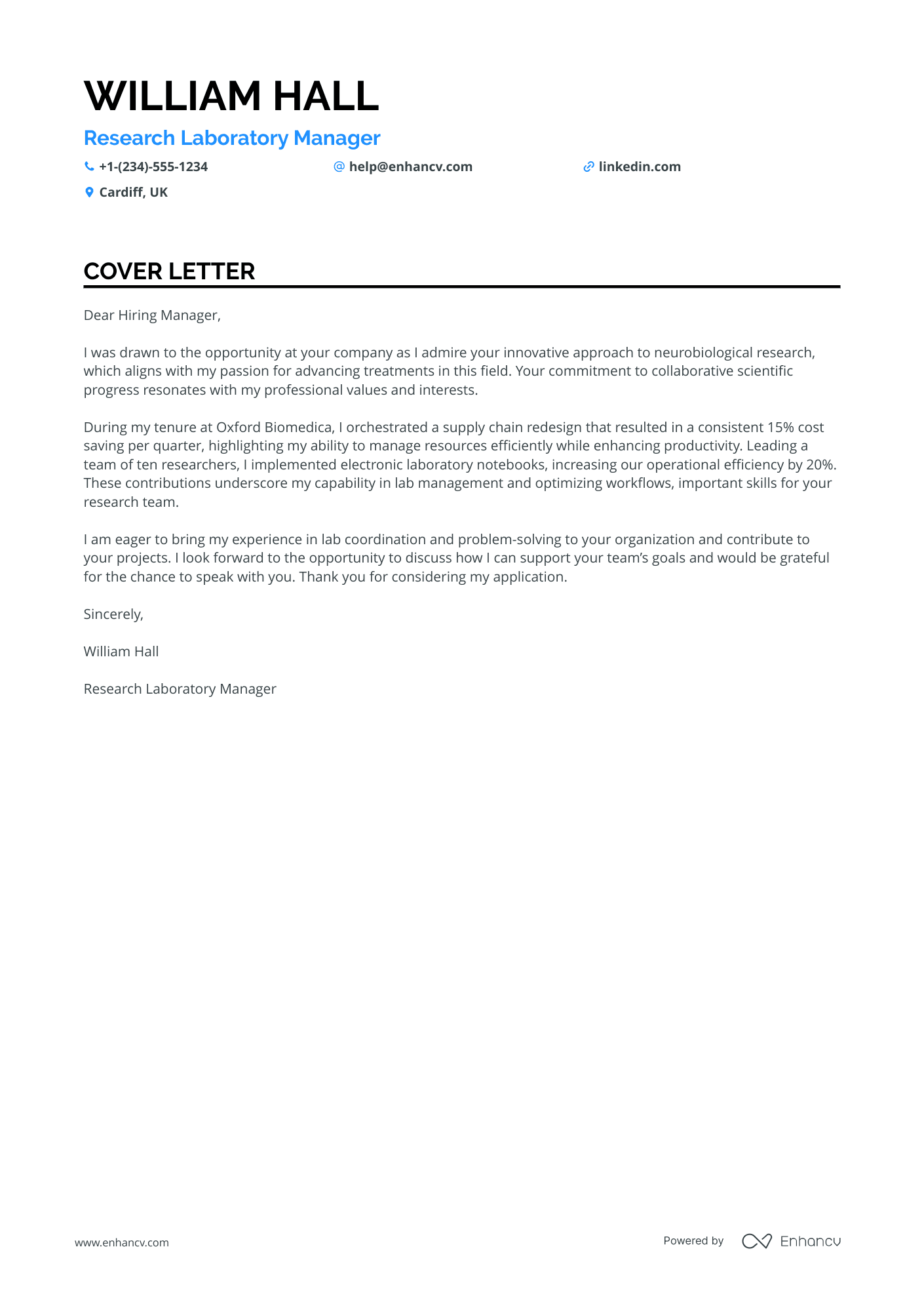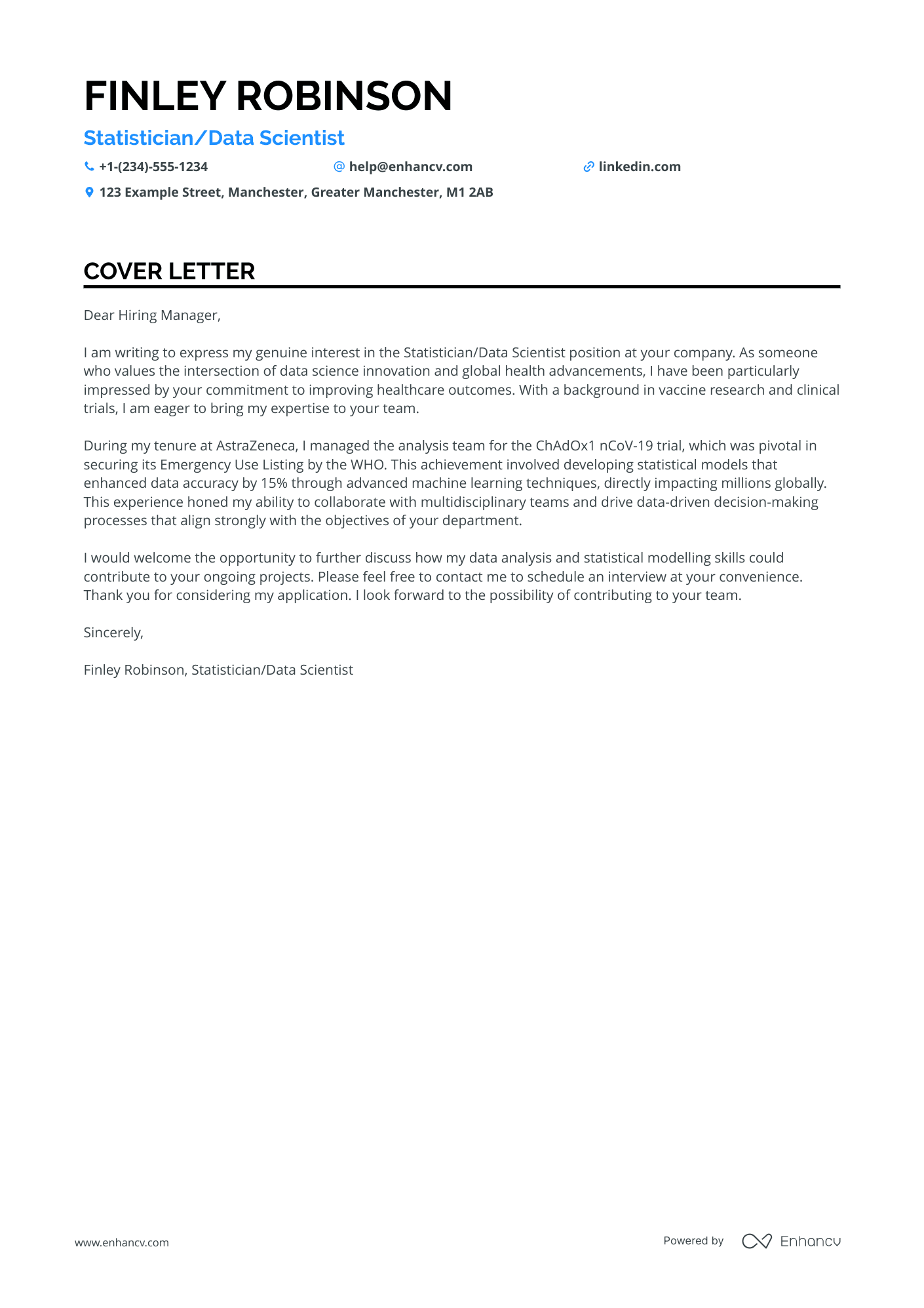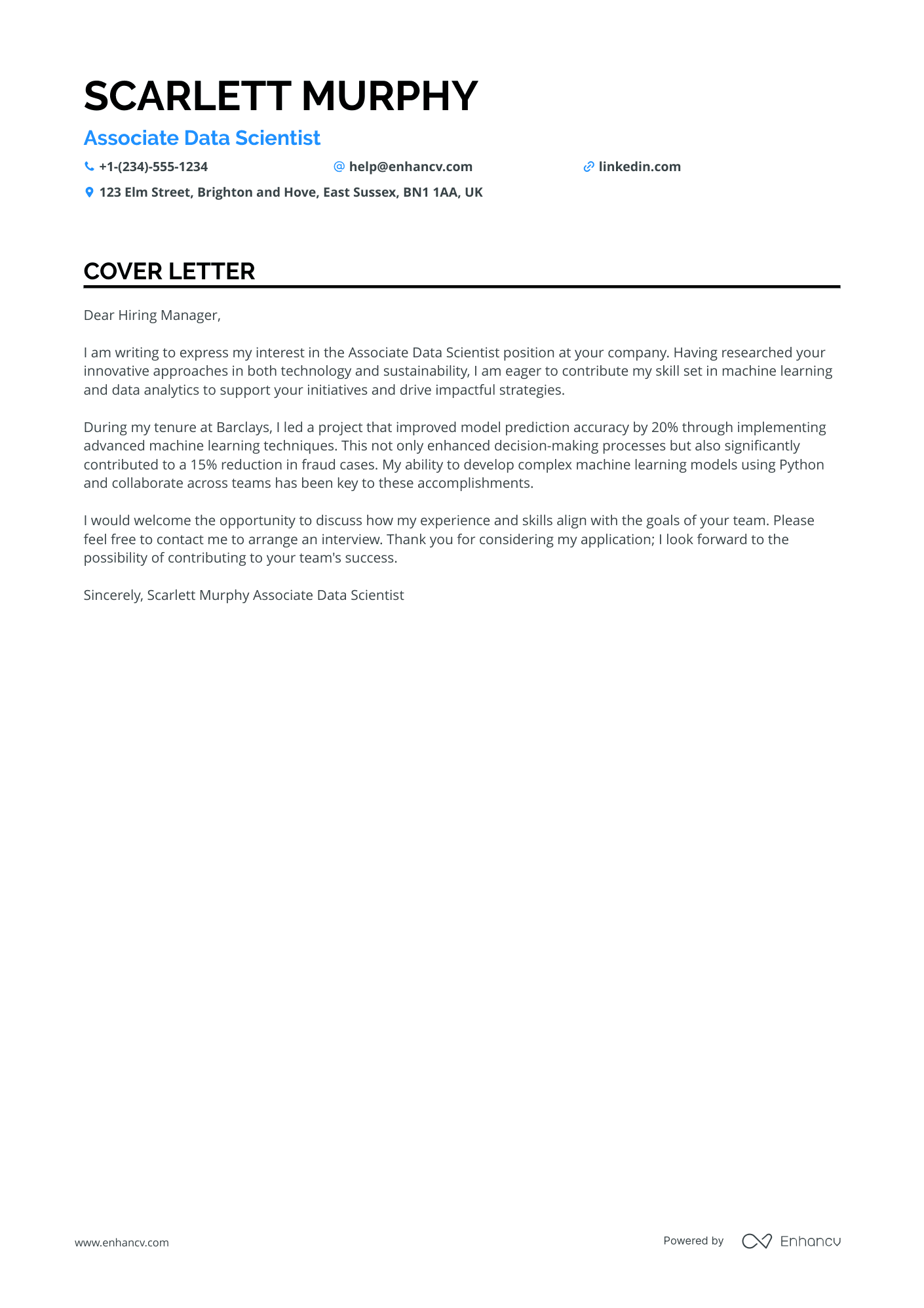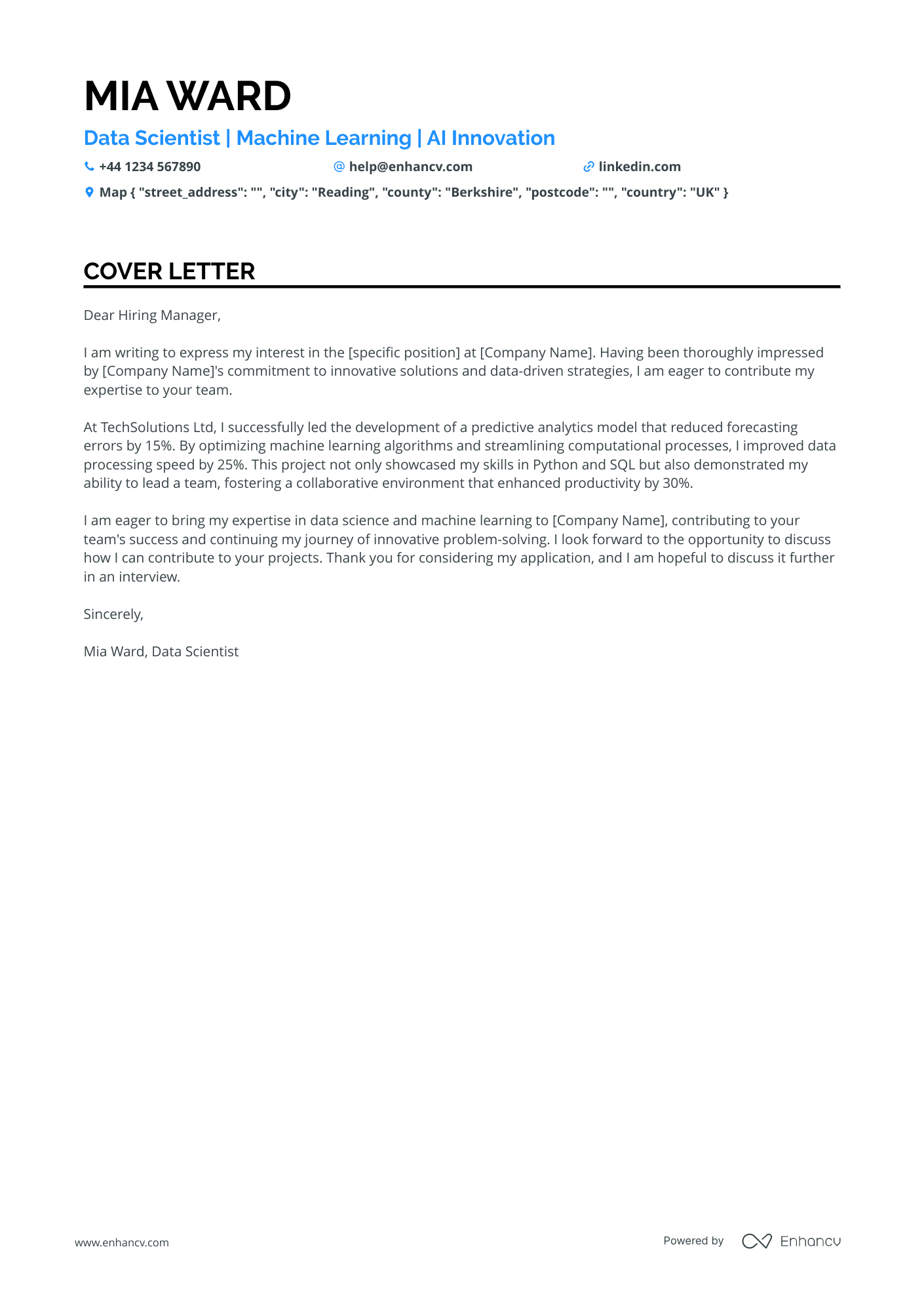You want your cover letter to strike the perfect balance between being professional and showing some personality. But how do you achieve this?
If you write too formally, your tone may come across as stiff. If you're too casual, it may sound overly conversational.
While modesty is always valued, how can you confidently present your skills without sounding arrogant or boastful?
This guide will help you find the right balance, ensuring your cover letter is both professional and personable, while focusing on the key job requirements.
Cover letter examples for data scientist
By Experience
Junior Data Scientist
- Emphasise Industry-Specific Skills: The cover letter effectively highlights skills pertinent to the Data Science field, such as Python, R, SQL, and cloud computing with AWS, which are crucial for technical roles like Junior Data Scientist.
- Showcase Relevant Experience: Demonstrating past experiences like optimising predictive models at Kwik-Fit to improve customer satisfaction and collaborating with cross-functional teams showcases the applicant's proven ability to apply data science effectively in a business context.
- Highlight Quantifiable Achievements: The inclusion of quantifiable outcomes, such as a 15% improvement in customer satisfaction and a £500K revenue increase, provides concrete evidence of the candidate’s impact, which strengthens the application.
- Focus on Ongoing Learning: Mentioning completed courses such as "Advanced Analytics Techniques" on Coursera underscores the candidate’s commitment to continuous learning and staying updated with industry advancements, reflecting initiative and dedication.
Senior Data Scientist
- Highlighting Achievements: The cover letter effectively highlights significant achievements, such as increasing predictive accuracy by 30% and saving £500k annually, which underscores the candidate's impact on business outcomes.
- Relevance of Skills and Experience: It prominently features relevant skills like Python, SQL, and machine learning expertise, alongside specific contributions in past roles, illustrating suitability for AI-driven projects.
- Connection to Industry Trends: Demonstrates engagement with current industry trends through the completion of an advanced Coursera specialisation in deep learning and neural networks, enhancing credibility in AI innovation.
- Mentoring and Leadership Abilities: Emphasises leadership qualities, showcasing the candidate's experience in mentoring junior scientists, contributing to improved team efficiency and fostering an environment of professional development.
Lead Data Scientist
- Highlighting Relevant Experience: The cover letter effectively showcases Finley's extensive experience in data science, specifically in leading predictive modelling projects and improving pricing models, which is crucial for a Lead Data Scientist role.
- Emphasising Skills and Tools: The inclusion of skills such as Python, SQL, and machine learning, along with tools like Snowflake and GitHub, underlines Finley's technical proficiency, which is vital for driving data-driven solutions.
- Showcasing Leadership and Mentorship: By mentioning the leadership of cross-functional teams and mentoring junior members, the cover letter illustrates Finley's ability to lead teams and develop talent, which is a key attribute for a lead role.
- Certifications and Courses: Finley's participation in advanced machine learning courses from reputable platforms like Coursera and EdX indicates a commitment to continuous learning and expertise in cutting-edge techniques.
Principal Data Scientist
- Experience and Impact: The cover letter effectively highlights Florence Knight's extensive experience in data science and leadership roles, showcasing the tangible impacts made in team management and innovative solutions, such as achieving a 35% increase in model efficiency.
- Certifications and Education: It mentions relevant certifications like the Deep Learning Specialisation and advanced machine learning courses that enhance credibility in specialised AI and ML roles, backed by strong academic credentials in Data Science and Mathematics.
- Skills Alignment: The letter effectively aligns Florence's skills, such as TensorFlow, GCP, and Kubernetes, directly with industry demands, making a strong case for expertise in cutting-edge technologies expected from a Principal Data Scientist.
- Achievements Highlighted: Noteworthy achievements, like developing market-leading AI solutions and successful cloud migrations, are clearly listed, demonstrating Florence's ability to drive significant improvements in AI model outcomes and system scalability.
Data Science Team Leader
- Highlighting the successful spearheading of a team to design scalable data pipelines demonstrates leadership and technical prowess crucial for a Data Engineer position.
- Emphasising ETL/ELT expertise and specific achievements in enhancing data process efficiency aligns closely with the data strategy focus of the role.
- Including advanced certifications, such as the Udemy certification on implementing CI/CD practices in data engineering projects, underscores a commitment to staying current with industry practices.
- Showcasing successful mentorship and team leadership experiences, as seen in the role at Accenture, is critical for roles involving team management and project leadership.
By Role
Data Science Project Manager
- Highlighting cross-functional leadership and project optimisation skills tailored to the Portfolio Manager role, showcasing the ability to manage and optimise resources across multidisciplinary projects.
- Emphasising proficiency in agile methodologies, which are crucial for enhancing project completion rates and aligning with modern project management practices.
- Detailing improvements and achievements such as optimising resource allocation and process efficacy, demonstrating tangible results like increased project delivery efficacy and reduced delays.
- Showcasing relevant certifications and courses, such as Agile Project Management and Advanced Risk Management, which underscore commitment to continuous learning and specialised expertise in the field.
Data Science Consultant
Emphasise specific achievements, such as improving client retention by 20% through predictive models, which directly illustrate impact and effectiveness in data-driven roles.
Highlight collaborative experiences like refining credit scoring models as part of a team, demonstrating teamwork skills crucial for large organisations like Deloitte and EY.
Include education and specialised training pertinent to the field, such as a Master's in Data Science and advanced courses from recognised institutions, underscoring expertise and commitment to the profession.
Leverage key technical skills and applications prominently, including proficiency in Python, R, Hadoop, and SAS, all of which are highly relevant to data science and crucial for attracting the attention of potential employers in this sector.
Data Science Engineer
- Specific Skills and Technologies: The cover letter efficiently highlights skills and technologies such as Python, R, Matlab, machine learning, and predictive maintenance, all critical for a Data Science Engineer focused on analytics and condition monitoring.
- Measured Achievements: Quantifiable successes, like a 25% improvement in data accuracy and a 30% boost in predictive maintenance efficiency, effectively demonstrate the candidate's impact and capabilities.
- Domain-Specific Experience: Industry experience with companies like Transport for London and Network Rail, emphasising a track record of improving transportation systems through data-focused solutions.
- Formal Education and Relevant Courses: Relevant educational background in Data Science and Mathematics, complemented by courses in advanced data science techniques and cloud security, establishes a strong foundation for the role.
Data Science Researcher
- Specialisation in cell biology and genomics is prominently highlighted, aligning perfectly with the requirements of a data scientist role in these fields.
- Showcases advanced skills in Python and R, which are critical programming languages for handling large volumes of scientific data and implementing machine learning models.
- Emphasises leadership experience and significant contribution to interdisciplinary teams, which is valuable for roles involving collaborative research and development projects.
- Demonstrates a strong publication record and awards, signalling the ability to produce and communicate high-quality research findings in top scientific forums.
Data Science Instructor
- Highlight relevant experience: Emphasise your expertise in data analysis and machine learning through specific achievements, such as improving prediction accuracy by 20% or increasing meeting efficiency by 25%.
- Showcase education: Mention advanced degrees or certifications related to the field, such as a Master's in Data Science from the University of Edinburgh and the Advanced Machine Learning Specialisation from Coursera.
- Demonstrate teaching skills: Display your ability to impart knowledge and mentor others, as demonstrated by improving student pass rates by 30% and organising workshops to enhance data literacy.
- Include passion & language skills: Mention your passion for data science education and sustainable technology, alongside your proficiency in languages like English and French, to depict a well-rounded professional.
Data Science Product Manager
- Tailored Skills and Experience: The cover letter effectively demonstrates specific expertise in Product Management, Data Science Projects, and Stakeholder Management, which are crucial for the role, providing a clear alignment between the candidate's skills and the job requirements.
- Quantifiable Achievements: By highlighting measurable accomplishments such as a 15% boost in operational efficiency and successful project deliveries, the candidate showcases their proven impact and value to previous employers.
- Relevant Education and Courses: Mentioning education like a Master's in Data Science and relevant courses such as "Advanced Product Management" underscores the candidate's commitment to continuous learning and expertise in cutting-edge practices.
- Strategic Leadership Acumen: The cover letter emphasises leadership capabilities with examples of managing cross-functional teams and executing strategic data-driven projects, positioning the candidate as an effective leader.
Machine Learning Data Scientist
- Highlighting Technical Skills and Experience: The cover letter effectively underlines core skills such as Python and cloud services, which align with the demands of a data scientist, showcasing practical applications that resulted in notable outcomes like increased data processing efficiency.
- Emphasising Project Impact and Achievements: The document includes specific examples of projects and their outcomes, such as improving threat detection accuracy by 35% and securing a £1 million contract, illustrating Archie Clark's proven impact on the organisations he's worked with.
- Demonstrating Leadership and Collaboration: The cover letter emphasises leadership by discussing team mentorship and cross-functional collaboration, crucial for roles that require aligning technical projects with client needs and internal goals.
- Detailing Relevant Education and Training: Mentioning a Master of Science in Artificial Intelligence and specific courses like Advanced Machine Learning Specialisation and Cloud-Based Machine Learning with AWS highlights Archie Clark's commitment to continuous learning and specialisation in relevant areas.
Data Science Architect
- Specific Certifications: Ava highlights her AWS Certified Data Analytics - Specialty and Power BI Data Analyst Associate certifications, which are critical for roles focusing on advanced data analytics and business intelligence.
- Quantifiable Achievements: The cover letter effectively uses statistics, such as a 25% reduction in overhead costs and a 30% improvement in data retrieval efficiency, showcasing Ava's impact in previous roles.
- Relevant Experience: With over 8 years of experience in data analytics and business intelligence, Ava showcases her progression in the field and her capacity for leadership and strategic thinking in her roles.
- Skills and Tools: Ava mentions a range of technical skills and tools such as SQL, Power BI, and AWS BI Products, which are vital for a data architect and analytics role, indicating her technical proficiency.
Data Science Operations Manager
- Emphasising industry-specific certifications such as the ITIL v4 Foundation Certification and CDCP certification to highlight expertise in service management and data centres.
- Showcasing leadership and team management skills by providing specific examples of leading cross-functional teams and managing large budgets effectively.
- Highlighting significant professional achievements such as a 30% reduction in system downtime and a 40% improvement in client satisfaction scores, demonstrating the ability to deliver results in a data centre environment.
- Incorporating a summary that clearly outlines over 10 years of relevant experience, immediately establishing credibility in site operations management and data centre operations.
Data Science Quality Assurance Specialist
- Certification Highlight: The cover letter effectively highlights relevant certifications such as "Advanced Good Clinical Practice" and "Pharmacovigilance and Risk Management Planning," demonstrating specialised knowledge crucial for the role.
- Proven Experience and Achievements: It emphasises key achievements like implementing a Quality Management System and achieving on-time CAPA completion, showcasing the candidate's ability to deliver impactful results in Quality Assurance roles.
- Skills in Regulatory Compliance: The inclusion of skills like "Risk Management," "Audit Management," and "Regulatory Compliance" directly aligns with the expectations for a Senior Quality Assurance Specialist, underlining the candidate's preparedness for the role.
- Passion for Continuous Improvement: By addressing the candidate's enthusiasm for advancing patient care and technology's role in healthcare, the cover letter conveys a commitment to ongoing learning and improvement, crucial traits for quality assurance positions.
Data Science Coordinator
- Specialised Skills and Certifications: Highlighting both the CRISPR Gene Editing Certification and courses in Advanced Techniques in Neuroscience underscores specialised knowledge in critical areas relevant to the role.
- Leadership and Management: Demonstrating management of a team and lab operations, such as optimising workflows and leading safety initiatives, signals strong leadership capabilities important for a managerial role.
- Scientific Achievements and Publications: Including publications in high-impact journals and collaboration in international projects highlights significant scientific contributions and successful cross-functional collaborations.
- Proven Efficiency Improvements: Detailing efficiency gains, cost savings, and productivity improvements within previous roles showcases a proactive approach to improving operational effectiveness.
By Industry
Clinical Data Scientist
- Certifications in Advanced Statistical Modelling and Bioinformatics: These courses not only enhance Finley Robinson's credibility but also cater directly to the specialised nature of the Statistician/Data Scientist role in healthcare and vaccine research.
- Key Leadership and Team Management Experience: Highlighting the ability to lead cross-functional and analysis teams, as demonstrated in coordinating the ChAdOx1 nCoV-19 trial, gives confidence in Robinson's capability to manage large-scale projects impacting global health.
- Impactful Achievements and Industry Recognition: Mentioning the WHO Emergency Use Listing success and high-impact publication in The Lancet provides tangible evidence of Robinson's effectiveness and esteemed positions in international public health and research communities.
- Specific Technical Skills and their Application: Detailing expertise in statistical modelling, machine learning, and bioinformatics encapsulates Robinson's technical proficiency pivotal to driving innovation and efficiency in clinical trials.
Financial Data Scientist
- Emphasising relevant achievements, such as improving model prediction accuracy by 20%, showcases technical prowess and direct impact on business objectives.
- Highlighting certifications and courses like "Advanced Machine Learning with Python" and "SAS Viya for Machine Learning" demonstrates up-to-date knowledge and specialisation in essential industry tools.
- Mentioning collaboration with cross-functional teams and the ability to influence strategic decision-making underscores strong analytical and communication skills essential for an Associate Data Scientist role.
- Aligning personal passions with professional responsibilities, such as leveraging data science for climate change advocacy, reveals alignment with potential employers' values and priorities.
Data Scientist cover letter example
Mia Ward
[object Object]
+44 1234 567890
help@enhancv.com
- Emphasize Impact: Highlight specific achievements that illustrate your contributions and impact, such as reducing forecasting errors by 15% or improving data processing speed by 25%.
- Demonstrate Technical Skills: Mention practical experience with relevant tools and languages, such as Python and SQL, to demonstrate technical competency essential for the role.
- Show Leadership and Collaboration: Highlight experiences that demonstrate your ability to lead projects and foster team collaboration, which are critical for roles requiring teamwork and leadership.
- Align with Company Goals: Express enthusiasm for the company's mission and demonstrate an understanding of their innovative strategies to show alignment with their values and objectives.
Importance of cover letters in the United Kingdom
Cover letters provide recruiters with the opportunity to learn more about your career aspirations, hinting at how you’d integrate within the organisation over the long term.
Here are three additional reasons why cover letters are important:
- Making an excellent first impression (and a formal introduction): Your cover letter is often the employer’s first introduction to you, showcasing your personality, communication skills, and motivation for the role.
- Complementing your career history: While your CV lists qualifications and experience, a cover letter provides the context, explaining how your background fits the role.
- Demonstrates your genuine interest: A well-crafted cover letter reflects the effort you’ve put into researching the company and role as well as your attention to detail.
What UK employers expect from a cover letter
When writing your cover letter for a UK employer, it’s important to keep several things in mind. First, you need to conduct a thorough research, which includes reading up on the company’s website, recent news, and their presence on social media. Understanding the company’s latest achievements and its overall mission will allow you to tailor your letter to their specific needs.
Next, focus on the company’s core values. Whether they value teamwork, innovation, or community involvement, highlighting how your own experience aligns with these principles is essential.
Finally, don’t forget to match your skills to the job’s requirements. Study the job description carefully and pick out the most important qualifications or competencies. Then, provide evidence of how you meet those criteria with concrete examples from your past work experience.
How to format a data scientist cover letter
To get your cover letter's formatting right:
- Use a modern font like Lato, Raleway, or Chivo, rather than the overused Arial or Times New Roman.
- Set your cover letter to be single-spaced with 1-inch (2.5 cm) margins on all sides—our templates are automatically set up for you.
- Ensure both your CV and cover letter are consistent in font style and formatting.
- Always send your cover letter as a PDF to prevent alterations and preserve its layout.
When it comes to structuring your cover letter, follow this sequence: begin with your address and contact details, then the employer's details (i.e. name and address), and the date. Next, start with a personalised greeting, followed by your introductory, body, and closing paragraphs. Be sure to include a sign-off and your signature at the end.
Remember, although Applicant Tracking Systems (ATS) software, which may scan your CV for keywords, won't read your cover letter, it will be reviewed by recruiters.
How to write your data scientist cover letter salutation
It's never advisable to begin your cover letter with 'Dear Sir/Madam', as it sounds comes across as impersonal.
Take the time to find out who is hiring for the role and address them directly in your cover letter greeting (e.g., 'Dear Mrs Chanceworth', 'Dear Harrod').
If you're uncertain where to find the hiring manager’s name, check the company website, look on LinkedIn, or send a courteous email requesting this information. Don't hesitate to ring reception either—they are unlikely to refuse to assist.
How to write your data scientist cover letter intro
One of the best ways to grab a hiring manager's attention? Show them the unique value you'd add to the team.
Review the skills or requirements listed in the posting and draw connections to your previous work experiences.
Focus on specific (and quantifiable) accomplishments and qualifications that align with the job description to make a strong first impression.
How to write your data scientist cover letter body
As you reach the body of your cover letter, you might wonder what to write in it.
Our advice? Don’t just copy your CV—choose your greatest achievement and tell its story.
Focus on how you got there using hard and soft skills, describe your involvement, and quantify the results with concrete outcomes.
Remember, recruiters aren’t looking for an epic tale of your career—they want something concise, relevant, and directly addressing their needs.
How to write a closing paragraph
When ending your cover letter, you have two options:
Option one is to promise how you’d contribute to the organisation—whether that’s improving a target or achieving a specific goal—or how the company could help you grow professionally. Always emphasise the tangible impact you can deliver.
The second option is to close by asking when you can expect to hear back from the hiring managers, whether for an update or to arrange an interview.
Conclusion
A standout cover letter is crucial for making an strong impression in your job search in the UK market. Personalise your letter by addressing it to the hiring manager and aligning your skills with the job description.
Use concrete examples to highlight your greatest achievement and convey your enthusiasm for the position. Finally, ensure that both your cover letter and CV are presented professionally for a consistent application.
